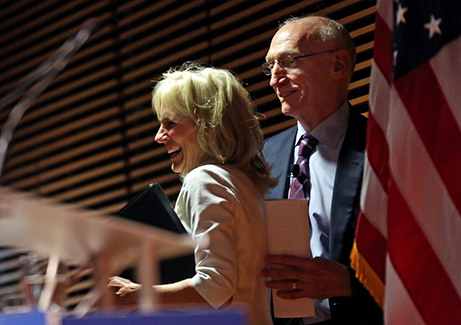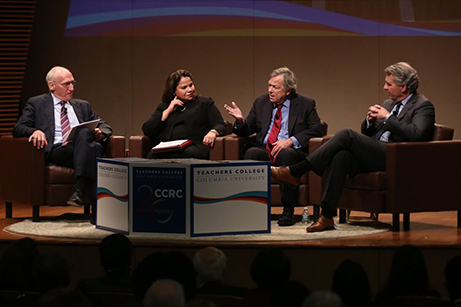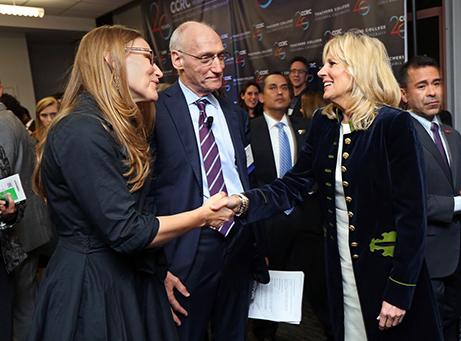In what was likely her last speech on community colleges as Second Lady of the United States, Dr. Jill Biden told the crowd gathered to celebrate the Community College Research Center’s 20th anniversary on November 17 that there was more work to do.
CCRC researchers must build on their groundbreaking research identifying the challenges community college students face and ways to overcome them, she said: “You literally wrote the book on ‘Redesigning America’s Community Colleges.’”
But Biden asked CCRC to do more. “We must document the lived experience of our students,” she said.
As an English professor at Northern Virginia Community College, Biden hears from her students about the financial problems and family issues that threaten to derail their education. One mother of four could not come to class because she could not pay for parking. Another had been kicked out of the house by her mother and did not know who to talk to. Because of these and similar stories, community college advocates need to make the case for wraparound services, Biden said. Teaching should also be a focus of future research, and CCRC should work to identify the best teaching strategies, she said.
“Above all, you must continue to document the case that we can’t afford not to invest in community colleges,” Biden told the audience of about 600 in Teachers College’s Cowin Auditorium.
Biden was the keynote speaker at the culminating event celebrating CCRC’s 20th anniversary year. Along with her speech, the event featured a panel on the future of community colleges with City University of New York (CUNY) Chancellor James B. Milliken, State University of New York (SUNY) Senior Vice Chancellor Johanna Duncan-Poitier, and Spencer Foundation President Michael McPherson.
The evening began with CCRC Director Thomas Bailey honoring Jesse Ausubel, who in 1995 as a program officer at the Alfred P. Sloan Foundation suggested that Teachers College write a proposal to create a center to research community colleges.
“Jesse had had the following insight: While 40 to 50 percent of undergraduates attended community colleges, and those students were disproportionately low-income, minority, immigrant, and first-generation college students, less than 10 percent of research on higher education even mentioned community colleges,” Bailey said. “That insight led directly to the founding of CCRC.”
Ausubel said with the first grant in 1996, he gave the center one charge — to get out into the field to talk to community college students and staff rather than focusing solely on data.
“The enormous success of CCRC shows the value of seeing things with your own eyes,” Ausubel said.
Video: Friends of CCRC share their congratulations
Video: Students talk about their positive experiences with community colleges
The panel discussed ways to help more students complete college credentials, the role of philanthropy, strategies for keeping college affordable, and the need to close equity gaps in higher education.
Duncan-Poitier said SUNY has stopped saying that if high schools sent them better students, they would get better results. Instead, she emphasized the need to invest in evidence-based strategies, including those identified in CCRC research. Creating more coherent programs along a guided pathways model, for one, just makes sense, she said.
“We don’t have any more time for pilots,” Duncan-Poitier said. “We can’t just impact a few hundred or a few thousand students.”
McPherson noted the stubborn persistence of gaps in graduation rates between different groups.
“Not only is this deeply unfair, but it is also shockingly wasteful in a country that can’t afford that kind of waste,” McPherson said.
Biden said she teaches community college for the same reason her husband, Vice President Joe Biden, served in the Senate and the administration: to help level the playing field. Though she switches between her jobs as Second Lady and college professor — literally changing from her teacher outfit to her Second Lady outfit in the airport lounge on her way to New York — her first priority is her students, she said.
“How many of you know that she taught three English classes today?” Teachers College President Susan Fuhrman asked the crowd as she opened the evening.
Bailey thanked Biden for her effective advocacy of community colleges over the last eight years.
“It’s worth remembering, given the coming change in national leadership, that community colleges have never been represented as a partisan issue,” Bailey said, “and that working to strengthen and make more affordable institutions that open the door to college and college success for every student is a goal that we can all support.”
Biden hosted the first White House Summit on Community Colleges in 2010 and went on the “Community College to Career” bus tour that traveled 800 miles and reached seven cities in five states. By the end of the decade, she said, two thirds of job openings will require some form of higher education.
“Too many hard-working Americans still feel that a college education is out of reach,” she said, calling for community college to be “free for all responsible students.”
Biden said that after her husband leaves office in January, she will continue to teach and to work on the campaign for free community college, called America’s College Promise, which has grown to 150 programs in 37 states.
“The secret on community colleges is out,” she said. “Our work now is more vital than ever. CCRC, I know you are up to this challenge.”



Photos by Bruce Gilbert




